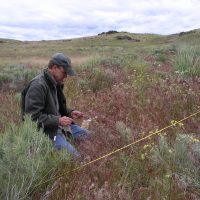Farm Manager Job Opportunity at Soil Born Farms
Soil Born Farms Urban Agriculture and Education Project
Job Title: Farm Manager
Program: Food Production and Farming Education – American River Ranch
Reports To: Co-Director
Farm & Organization Background
Soil Born Farms Urban Agriculture & Education Project is a non-profit educational farm in Sacramento, California. Our programs focus on promoting health and providing experiential learning opportunities for youth and adults, producing healthy food, improving access to healthy food for all and modeling land and environmental stewardship.
Coniferous Trees Highlighted in January Tours
When the Olmsted Brothers first came to the Seattle area in the early 1900s, they were impressed by the size, abundance and beauty of our native conifers. Thirty years later when they designed the collection placement for the Washington Park Arboretum, they made a point of not removing our native trees, but placing the arboretum collection within a matrix of these native conifers.
Read moreArt Exhibit: Al Dodson Photography
Beautiful photographs on exhibit and on sale in the Miller Library Jan. 2 through Feb. 12th.
Read moreStaff Spotlight: Annie Bilotta

Annie Bilotta is a Gardener, working at the Center for Urban Horticulture. She is originally from New York State, and she moved to Seattle in 1989. Annie started working at the UW Botanic Gardens in 1993 at the Washington Park Arboretum as a Gardener. She moved over to the Center for Urban Horticulture around 2005.
Annie is especially fond of vegetable gardening.
Volunteer Spotlight: Richard Fleenor

Meet Richard Fleenor. Richard is a Rare Care volunteer with UW Botanic Gardens. He monitors rare plant populations on the east side of the state and usually takes one to two assignments a year. Rare Care volunteers live in all parts of the state of Washington, plus northern Oregon.
Richard grew up in Vancouver and loved playing in the woodlands surrounding their house as a kid.
Deck the Halls
Boughs used as winter decoration are often from plants in the genus Ilex. Many Ilex, or holly species are dioecious, meaning that male and female reproductive organs are separated on individual plants. This trait promotes cross-fertilization which increases genetic variability, but can decrease seed-setting efficiency. Solitary individuals are unable to be pollinated, therefore it is necessary that male and female plants grow in close proximity or female plants will not produce berries.
Read moreGlimpse into the past – Trees Have a Habit of Growing
By John A. Wott, Director Emeritus
It is said that humans “have a habit of growing.” We grow tall in our formative years, and most of us also grow wider in the later years. We could also say that trees have a habit of growing. Tree species grow to specific heights and widths. Some smaller trees obtain their normal mature size in a few years, while the larger species may grow for years and years.
December Color Appears at the Washington Park Arboretum
Conifer trees occasionally mutate into unusual forms, often slow-growing natural dwarfs. Thousands of these have been in cultivation for centuries. The Arboretum has only a few in its collection, sadly neglected in grid 37-1W – a corner of the Oaks area. Here are five examples:
1) Chamaecyparis lawsoniana ‘Lycopodioides’
Translated: “a form of Lawson’s false cypress that looks like Lycopodium” – a genus of club moss that’s said to resemble a wolf’s foot.
Read more